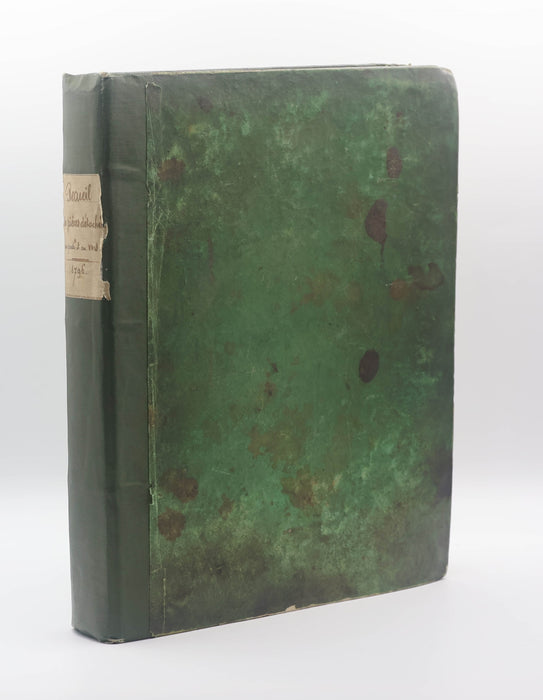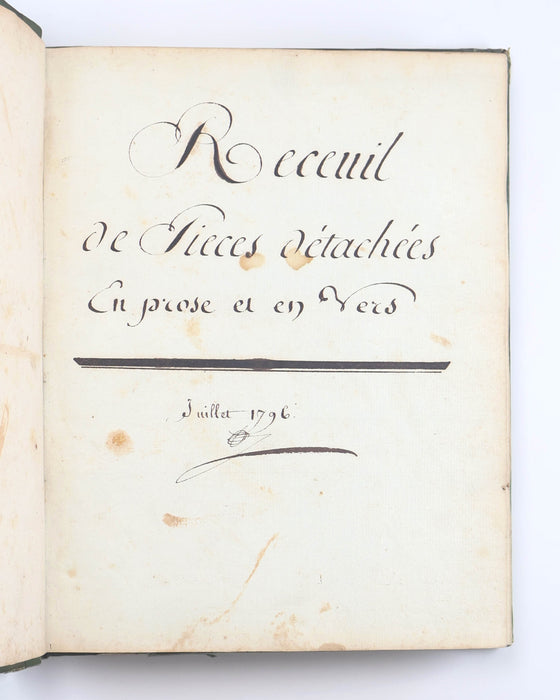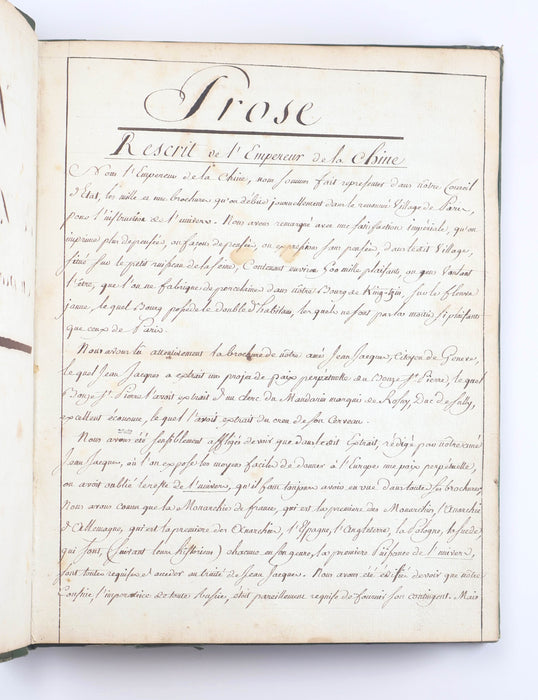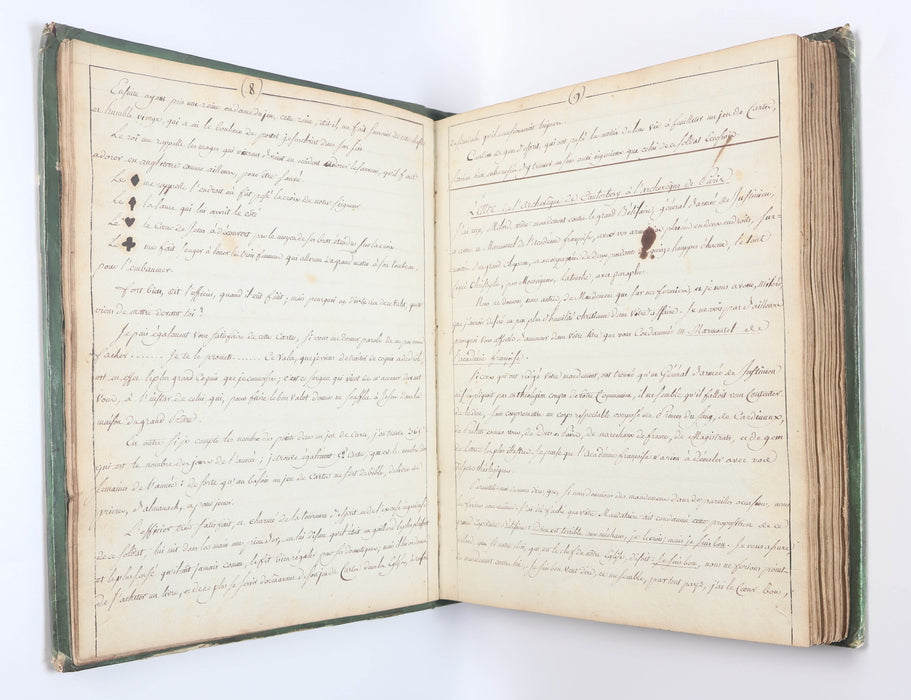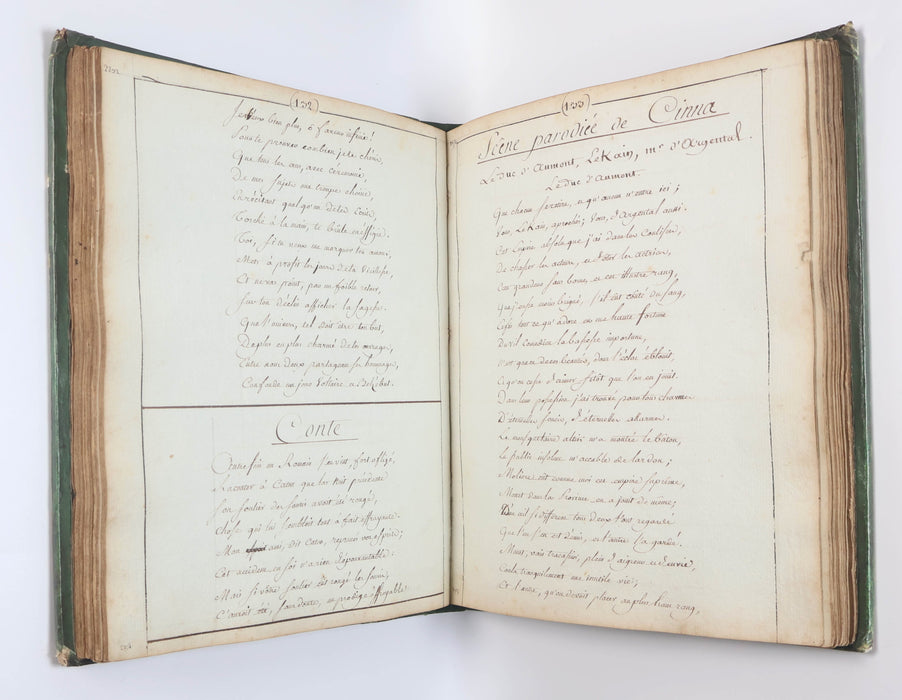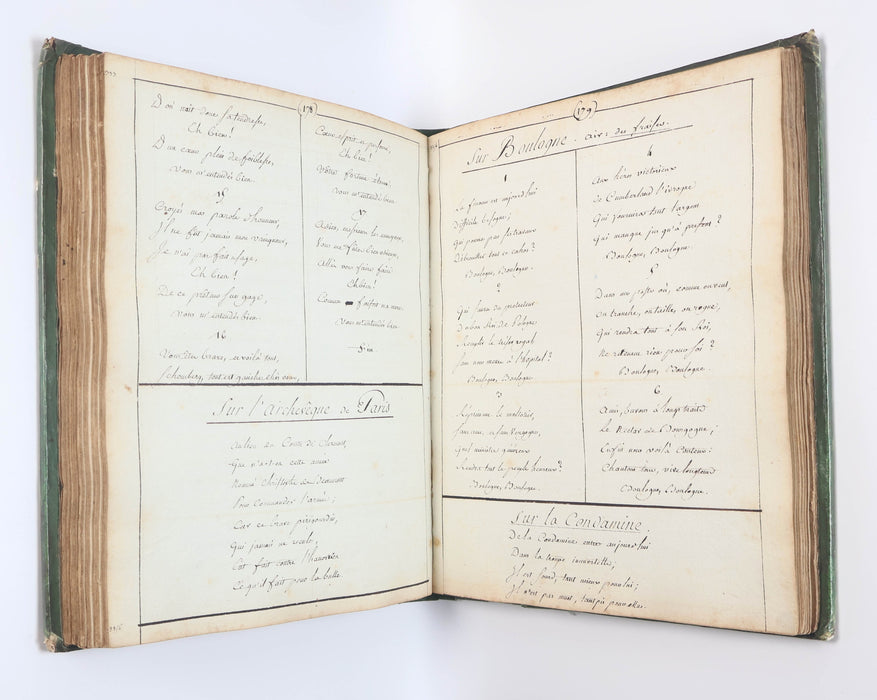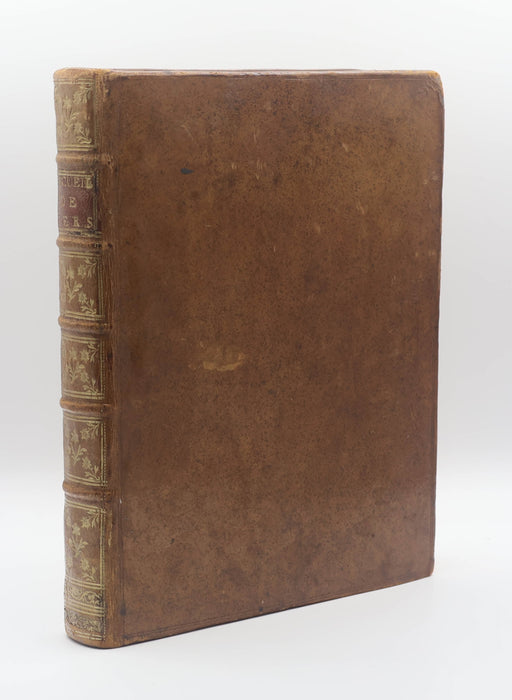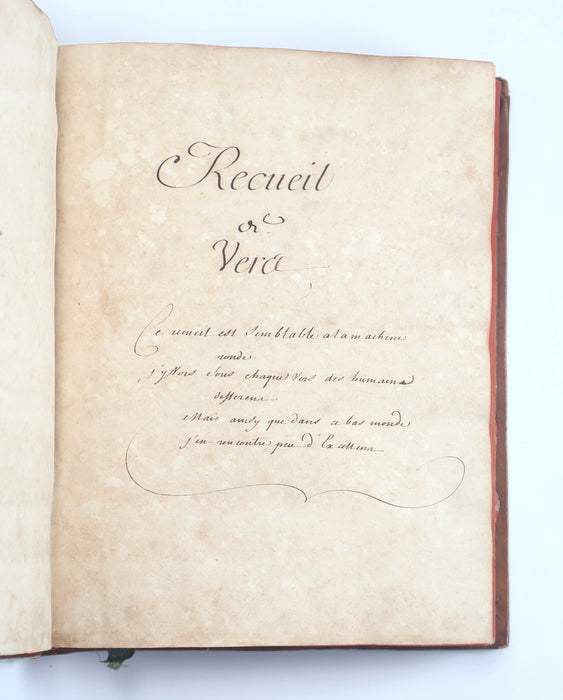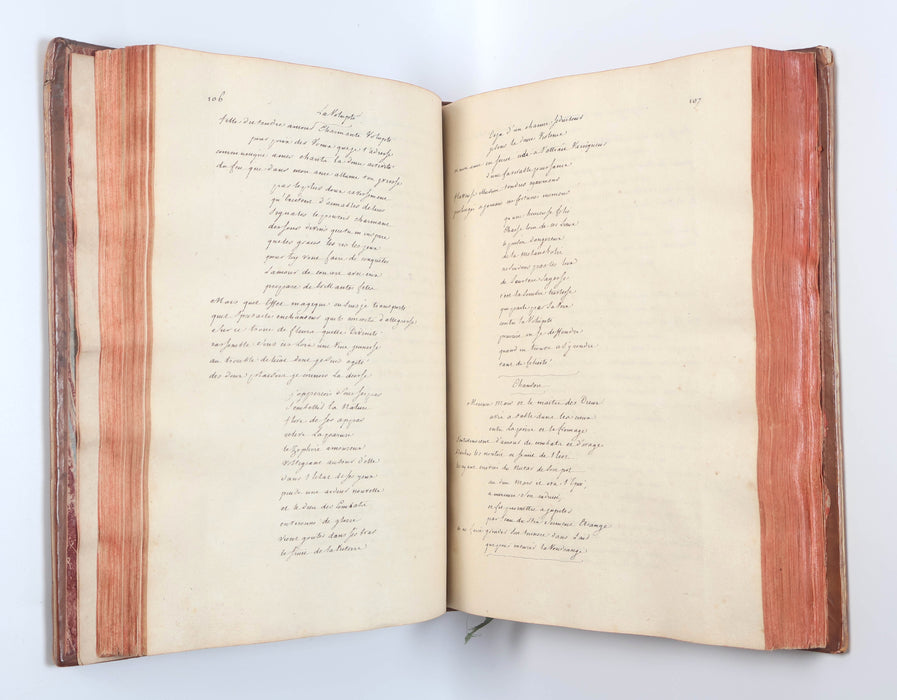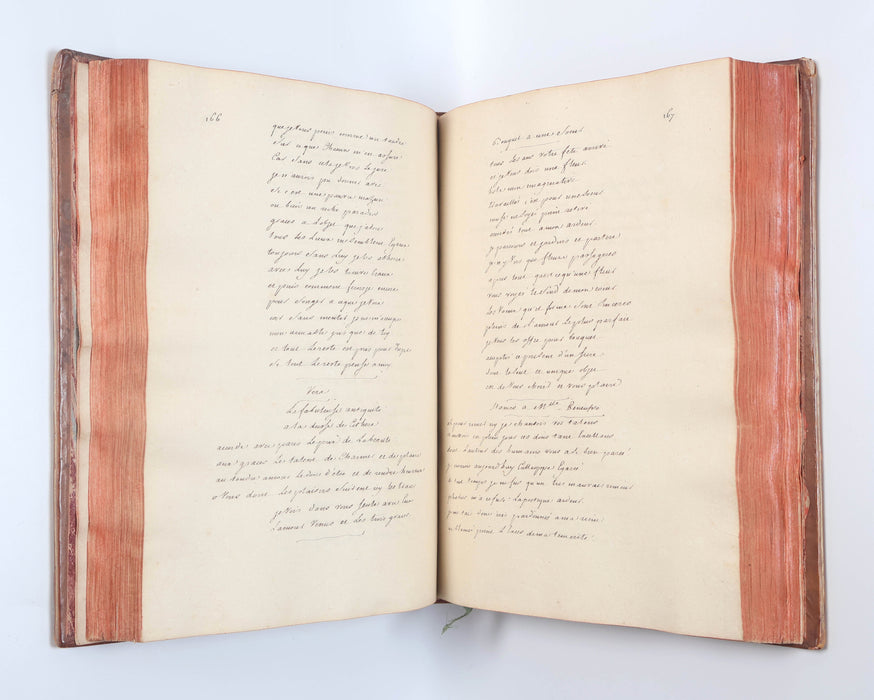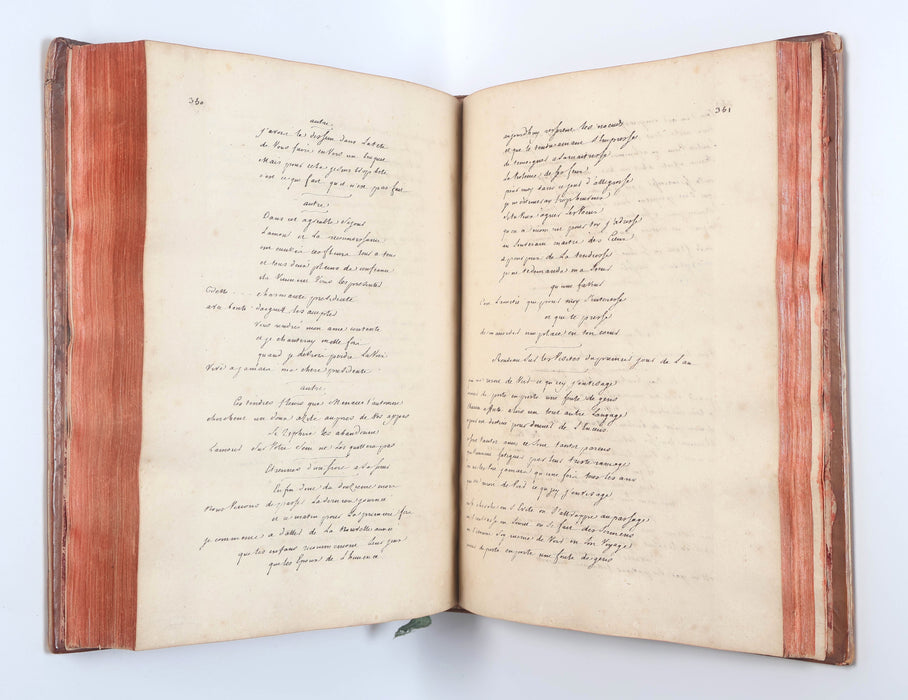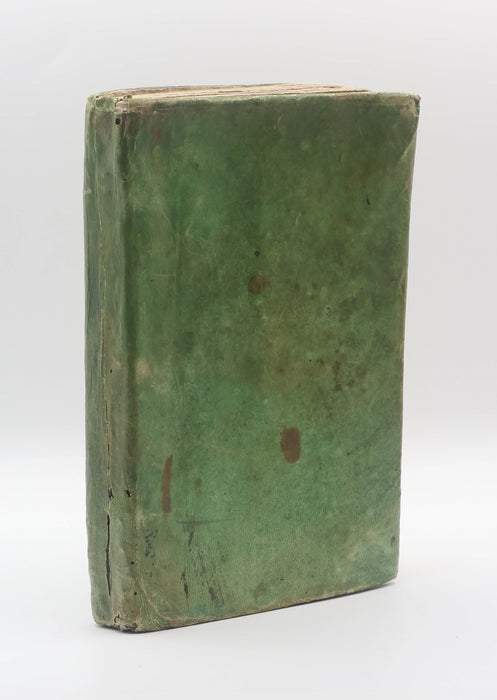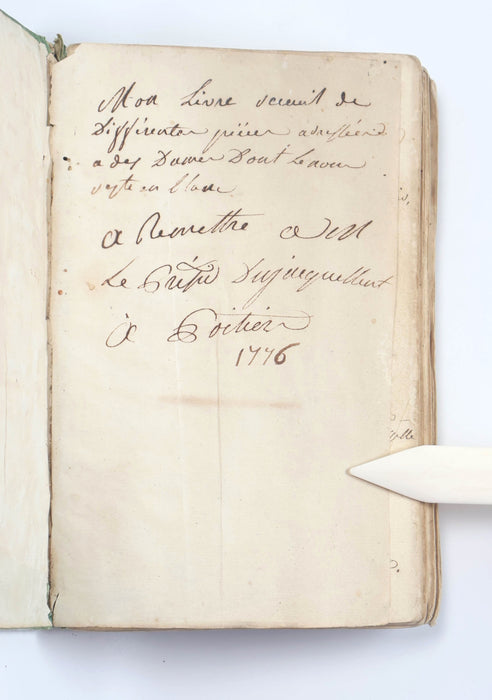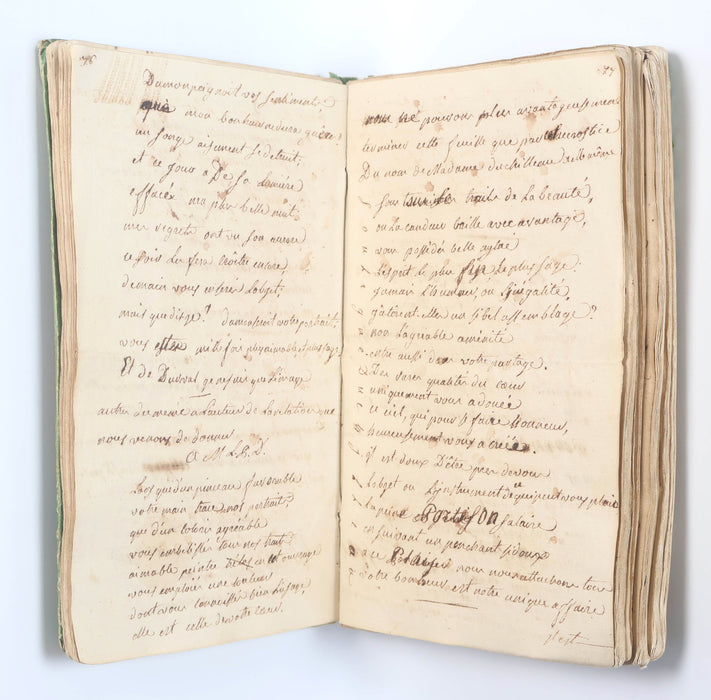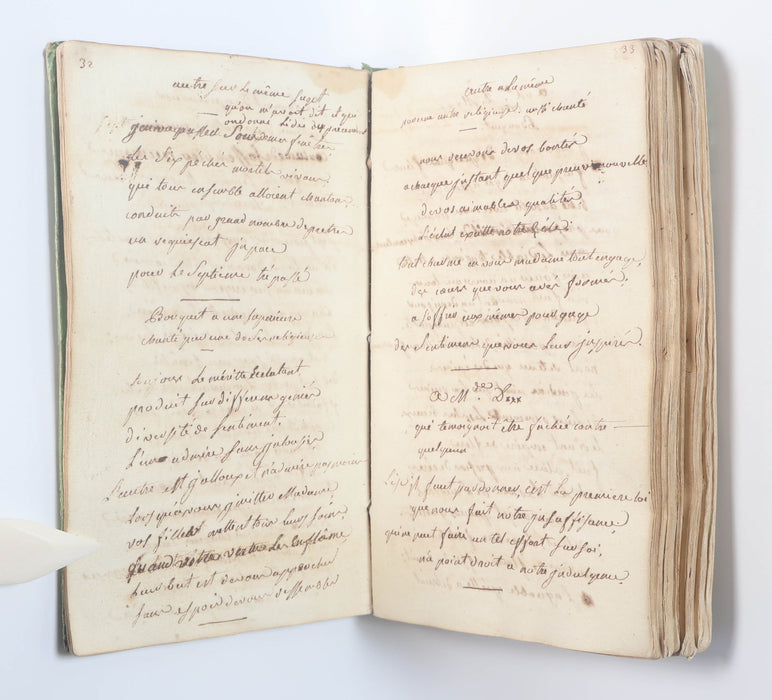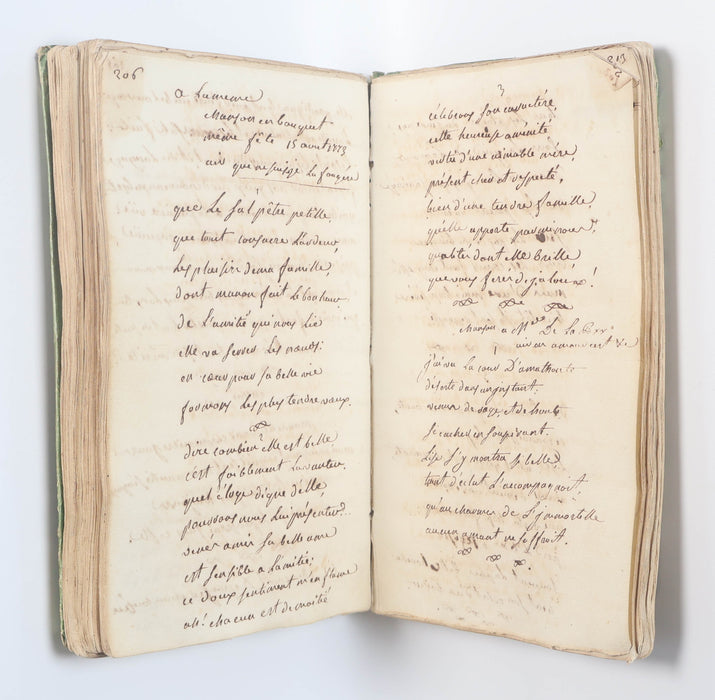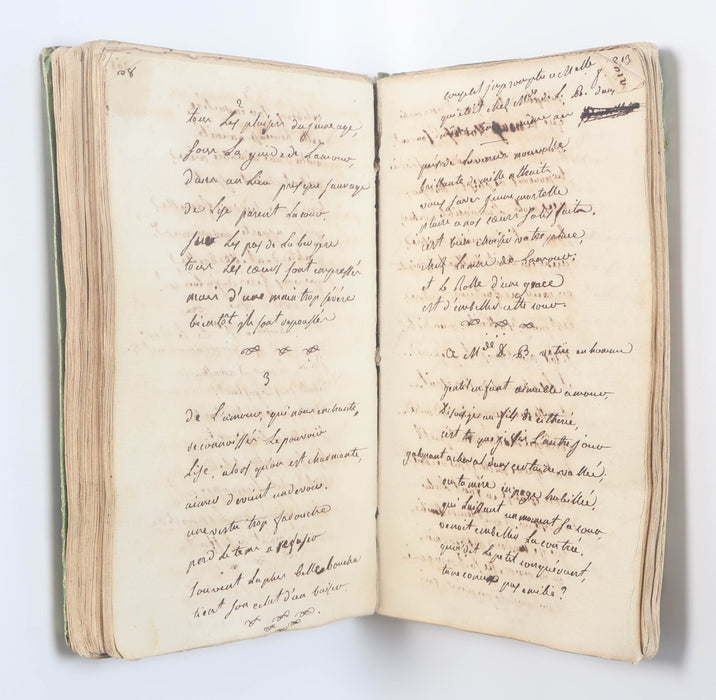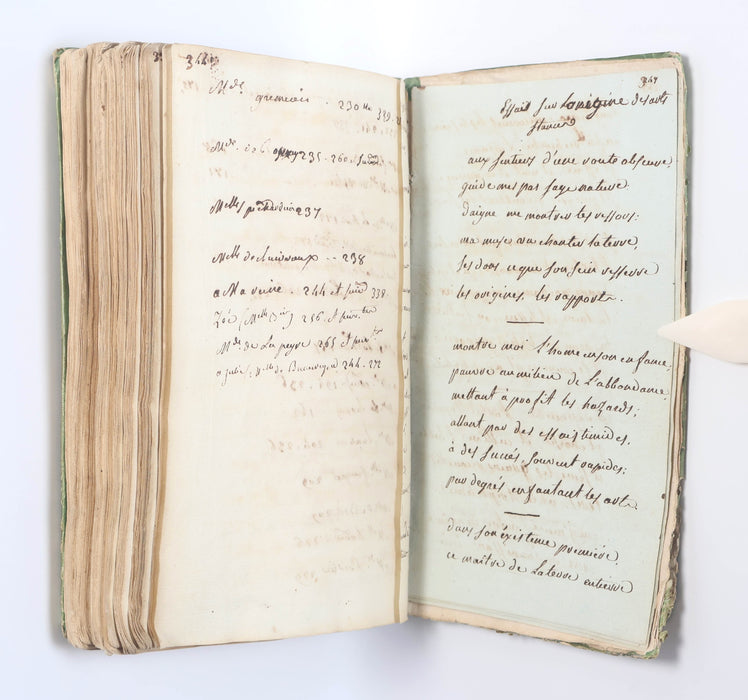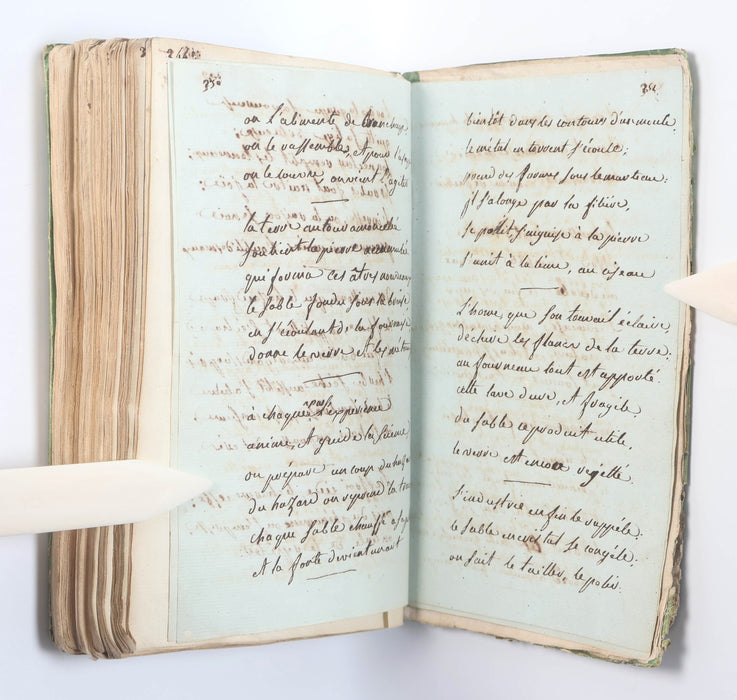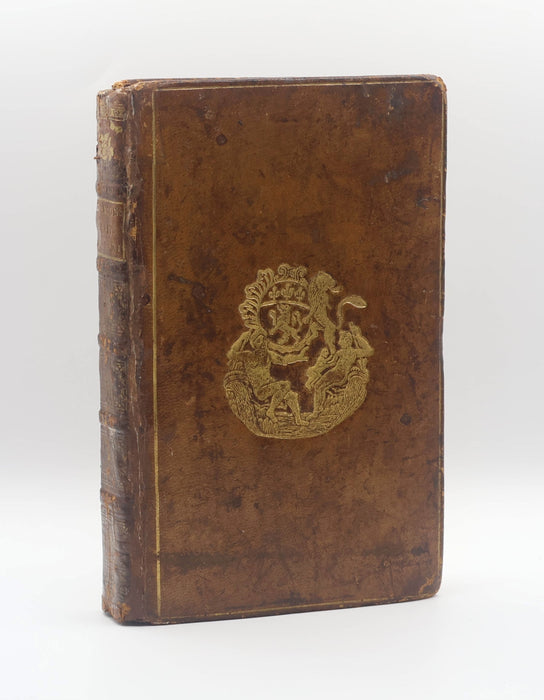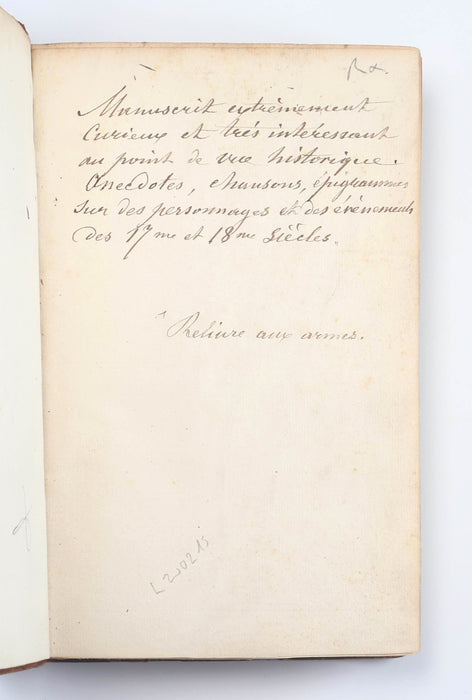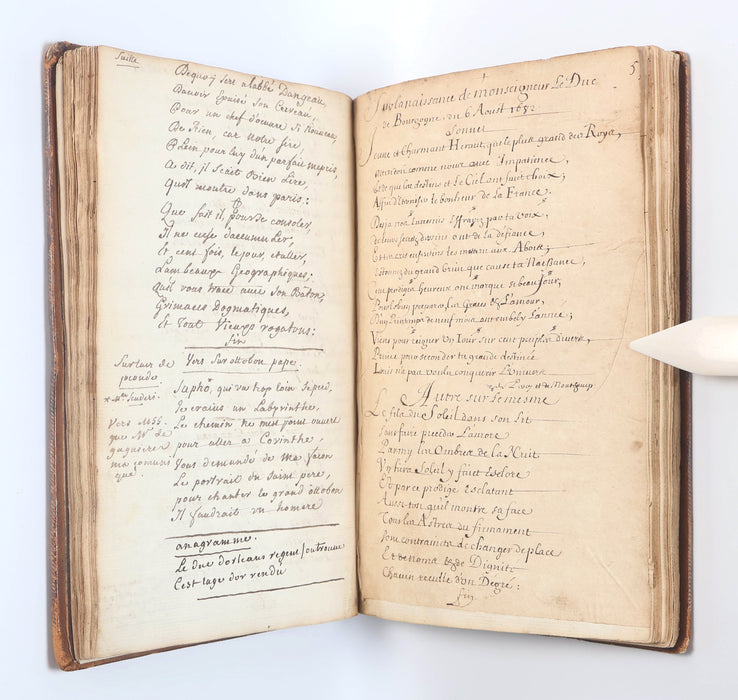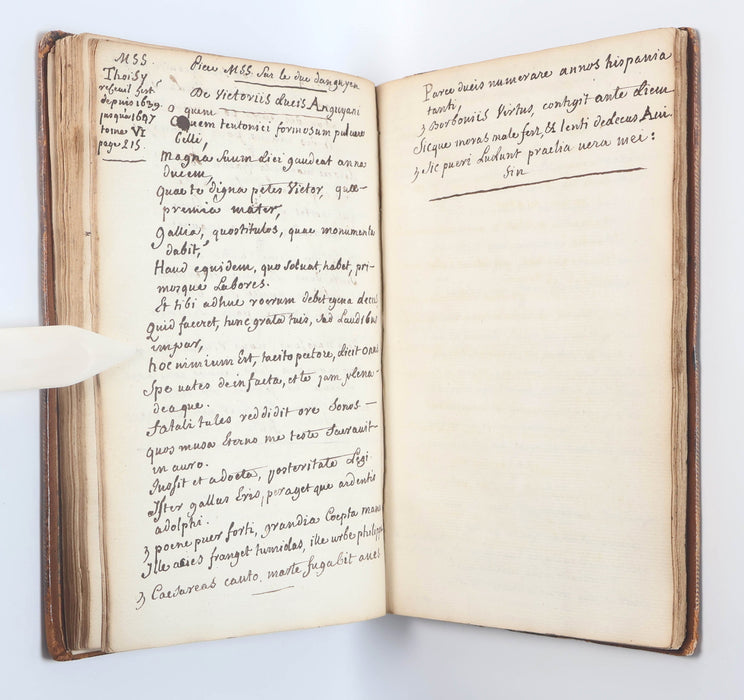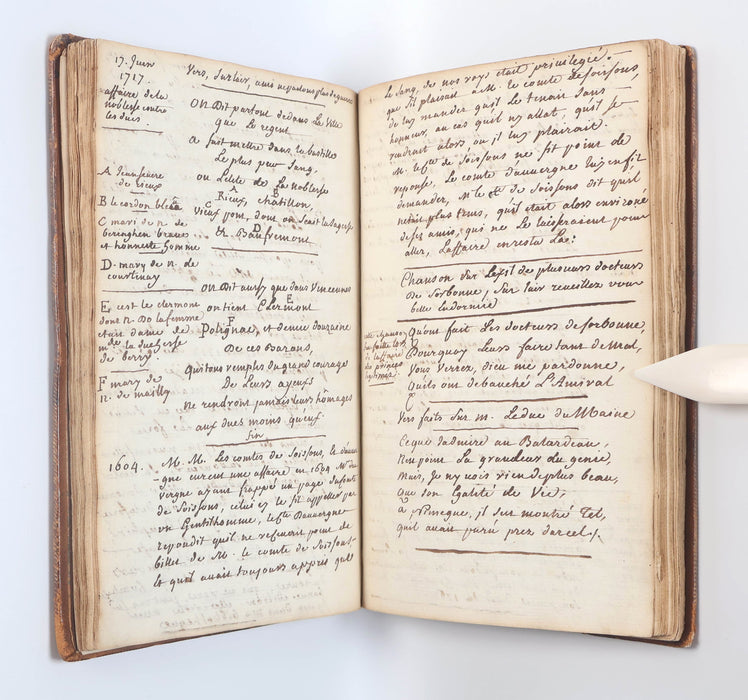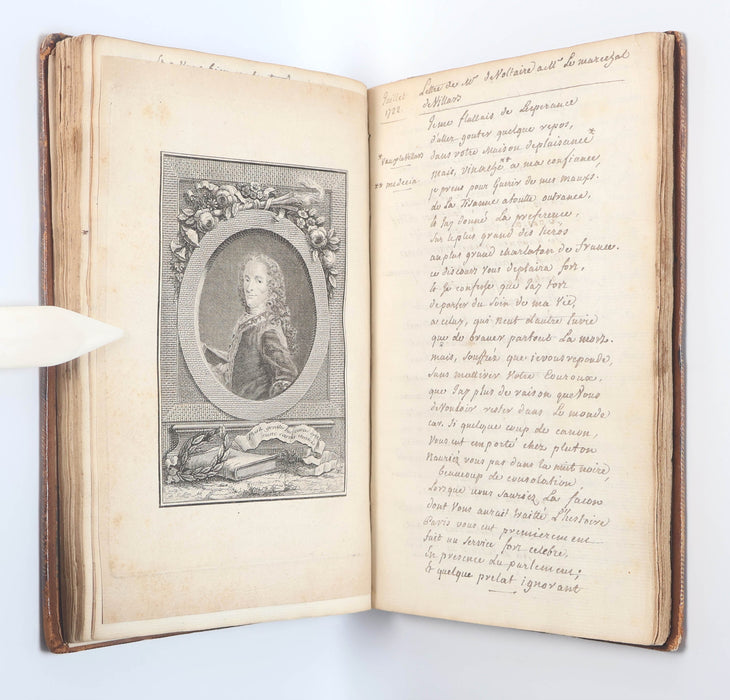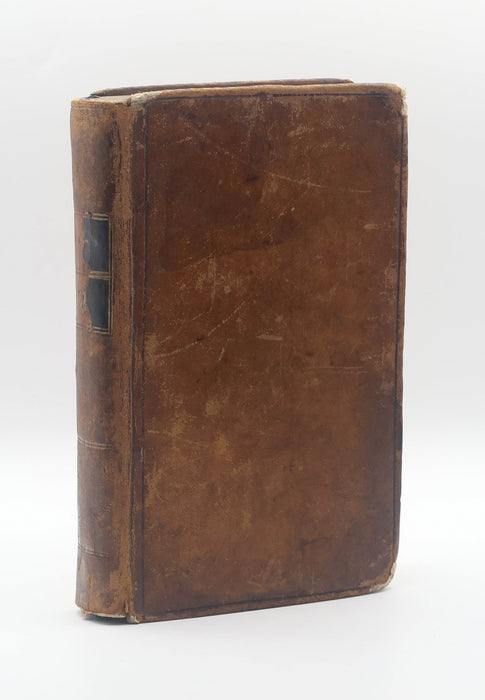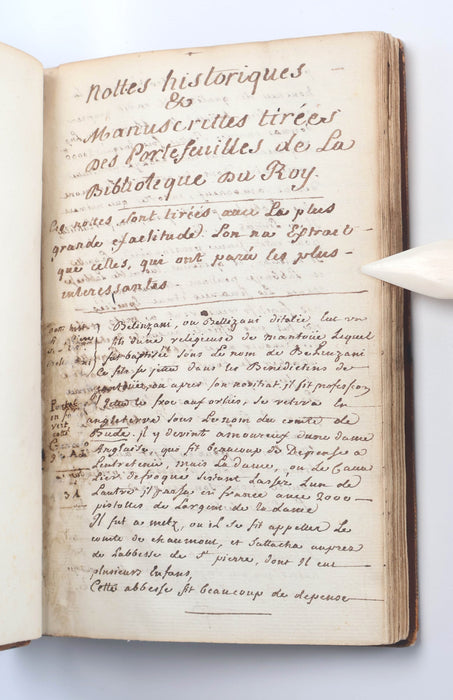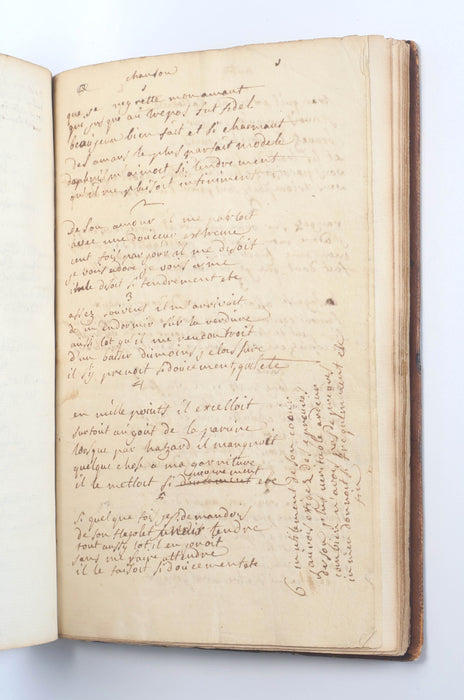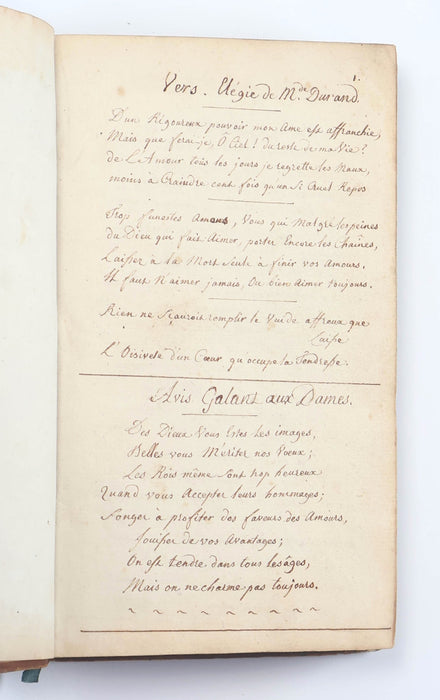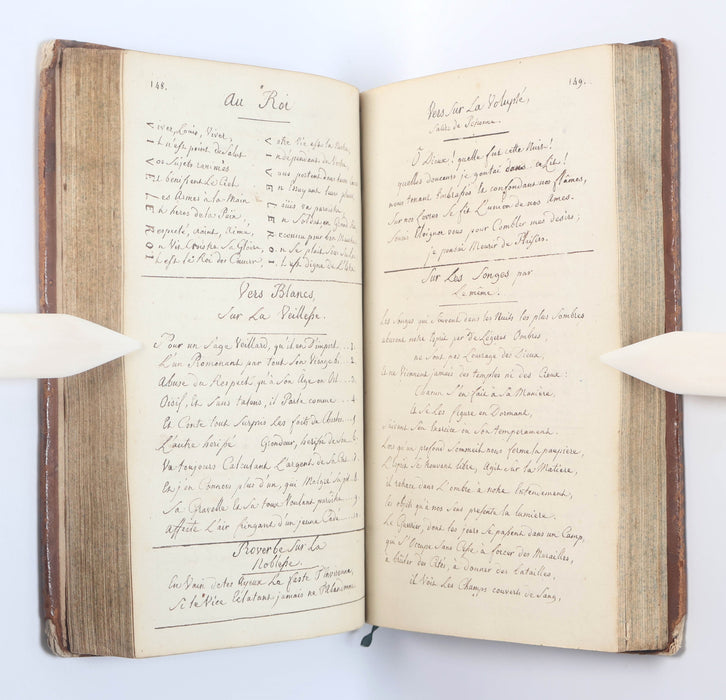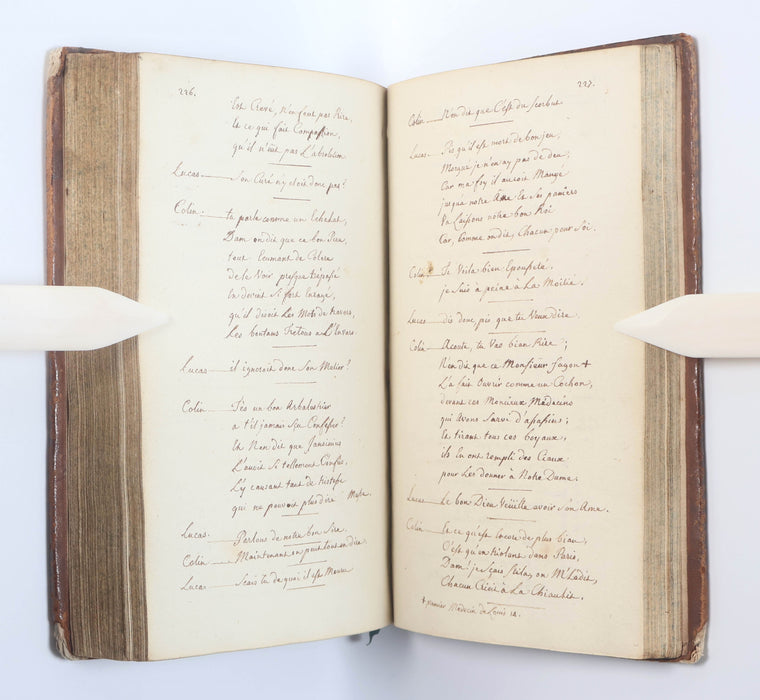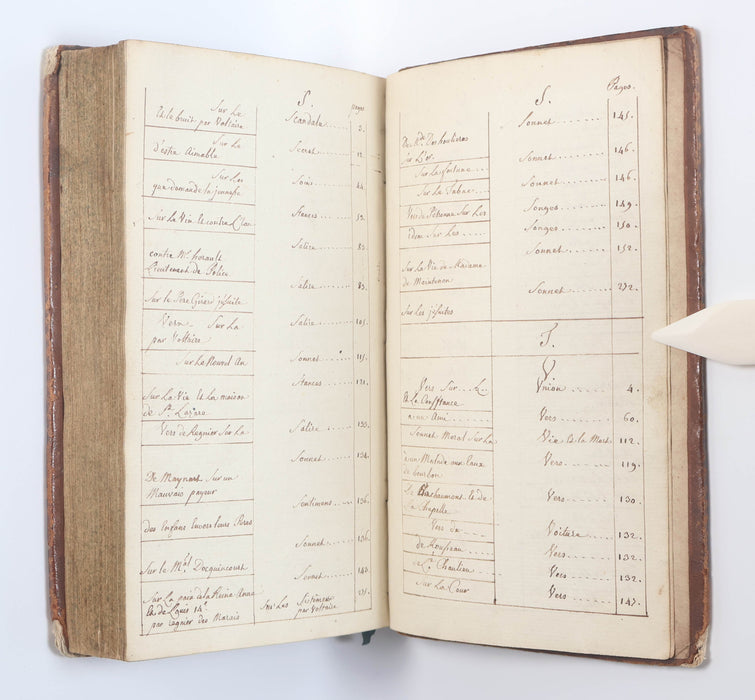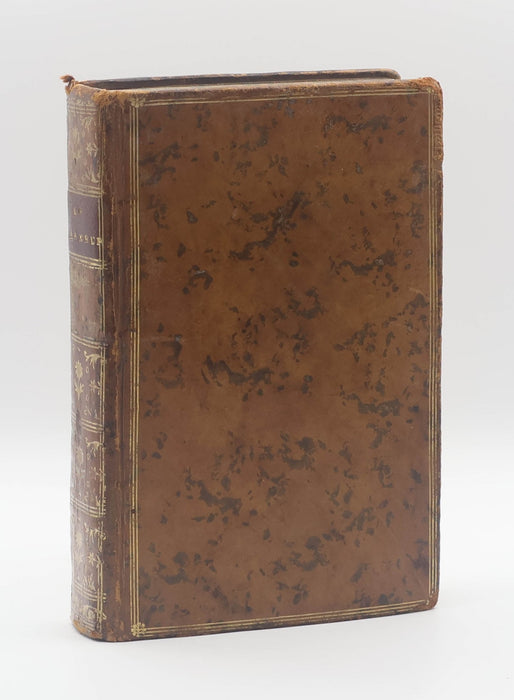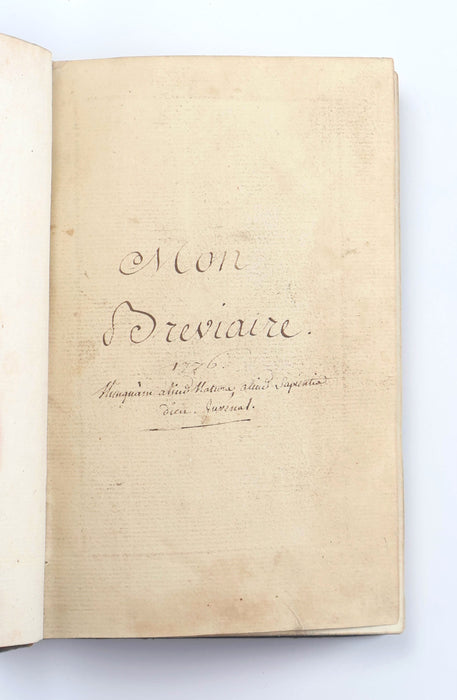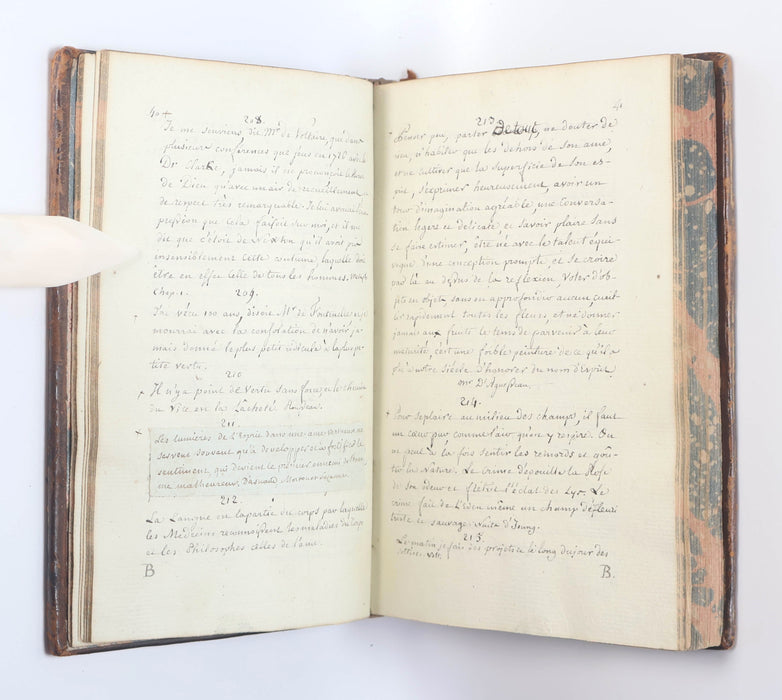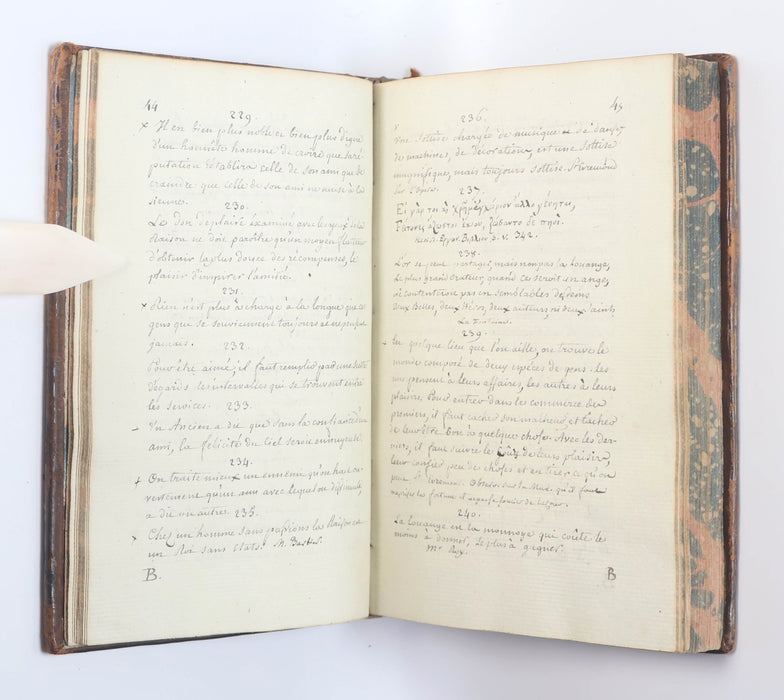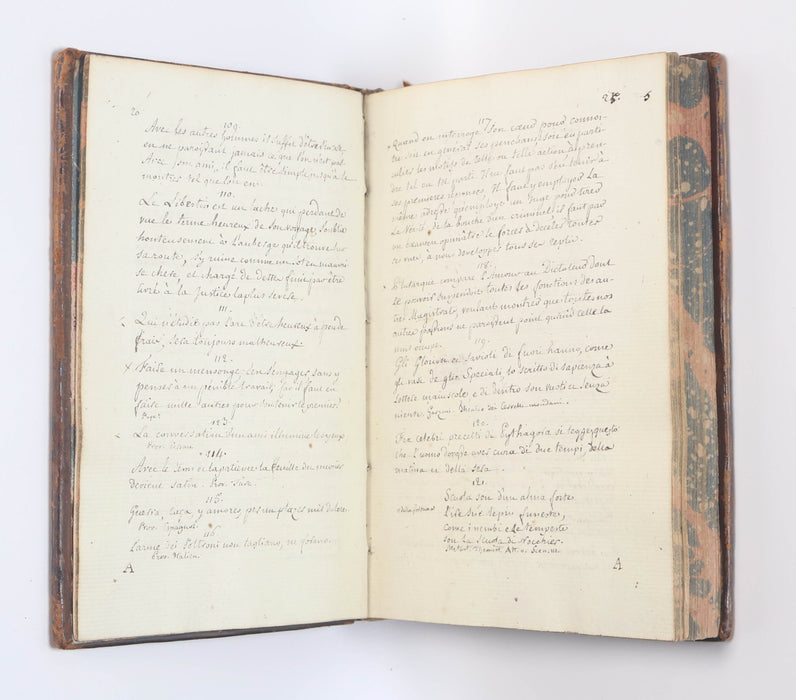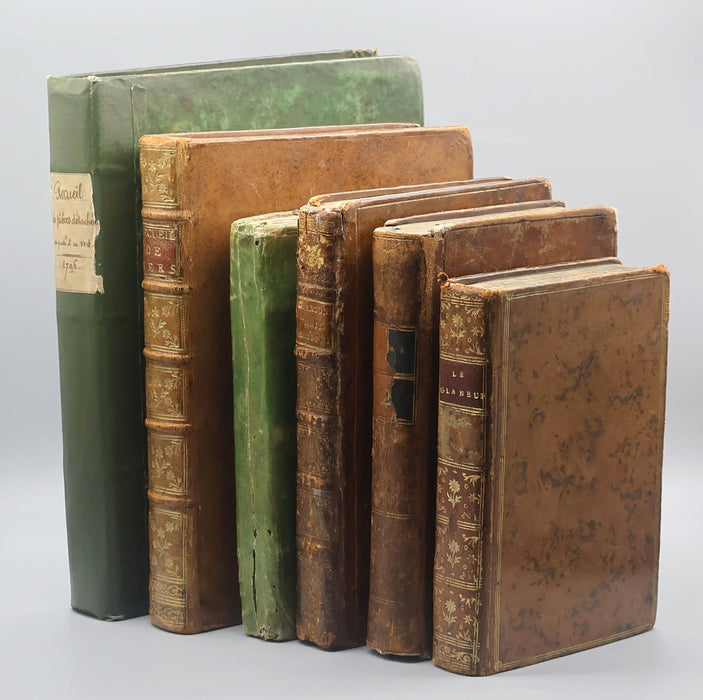
FRENCH MANUSCRIPT COMMONPLACE BOOKS
[Commonplace Books:] Six bound manuscripts [France] [1776-1796].
Six manuscripts offering an interesting conspectus of the commonplace book genre in eighteenth-century France, and demonstrating the wide range of material that could find a place in personal compilations. The contents variously include poetry, prose, songs, epigrams, epitaphs, and dialogues—often with an eclectic mix within a single manuscript. One manuscript (MS E) for example has a song on Boulogne, Marie Antoinette’s funeral oration, a poem on vanity, and a French version of the popular story of Richard Middleton, who was caught in a Scottish church using playing cards as a substitute for the bible (MS E, pp. 179, 289, 137, 6-9). One book (MS D) is composed of texts addressed to women, and another (MS A) is rich in material that has been tipped- or pasted rather than written in. Though each of these commonplace books is idiosyncratic in style and content, a recurring theme is a tendency towards including Voltaire. His work appears in MSS A, E, and F, and his engraved portrait is tipped into MS A. One of the manuscripts includes a poem addressed to a sister, in what sense we do not know (Bouquet a une Soeur (MS B p. 167)), while another is addressed to a mother superior Bouquet a une superieure chanté par une de ses religieuses (MS D, p. 32). A further commonality is the emphasis on effective information retrieval, with item numbering in MS F and a table of contents in MSS B-E.
A. Nottes historiques & manuscrittes tirées des Portefeuilles de la Biblioteque du Roy. France, eighteenth century.
This manuscript contains a complex mixture of notes, poems, songs, and epitaphs relating to people and events from seventeenth- and eighteenth-century French history. Some of the material—e.g. a poem on François Harlay de Champvallon, Archbishop of Paris (d. 1695)—was reportedly transcribed from copies in the Bibliotheque Royale (the forerunner of the Bibliothèque Nationale). At various points, manuscript material has been inserted wholesale, including a copy of a sonnet Sur la naissance de monseigneur le Duc de Bourgogne du 6 Aoust 1682. According to Olivier, this supralibros is one of several found on books given as gifts or prizes by the consulate of the city of Lyon, although ours was also singularly used on some Lyonese almanacs. How our manuscript came to be bound in such a way remains unclear.
Manuscript on paper (mostly carrying ‘DANGOUM…’ watermark, probably D’ANGOUMOIS), 20.3 x 13.3 cms in binding, pp. [306] overall (of which 113 are blank) - + endpapers. Includes 1 tipped-in engraved portrait of Voltaire with caption ‘Post genitis hic carus erit nunc carus amicis’. Additional manuscript material—roughly contemporary with the rest, but distinct from it—has variously been tipped in (4 pp), sewn in (28 pp), and mounted (onto 9 pp). Content is unruled throughout, written in multiple hands, and with varying numbers of lines per page. Bound in polished sheep over boards, covers tooled in gilt with coat of arms of Lyon (Olivier pl. 1874, no. 12) and a single fillet frame, gold-tooling to sides, spine compartments tooled in gold with sun motifs, gold-tooled brown goatskin label to spine (possibly not the original spine). Decorative paper pastedowns and endpapers (dark brown with pattern of small gold dots), early 19th-cent.?, with evidence of prior marbled pastedown at front. Provenance: 19th-cent descriptive notes in ink to second free endpaper, ‘Rx’ and reference number L20215 in pencil to front endpapers. Condition (textblock): historic repair to inner margin of p. [9]-[10] affecting c.10 words per side; light to moderate browning, some foxing, occasional tears to blank margins and at blank gutters. Condition (binding): rubbed, worn, crude repair to top joint, cracking to spine, top of spine missing headcap and “patched” with a piece from another binding, also possibly rebacked, reusing a different spine.
Olivier, Eugène, Manuel de l’amateur de reliures armoirées Françaises, vol. 10 (Paris, Ch. Bosse, 1930), pl. 1874, no. 12.
B. Recueil de vers. Ce recueil est semblable a la machine ronde J’y vois sous chaque vers des humaine different Mais ainsy que dans a bas monde j’en rencontre peu d’Excellent. France, eighteenth century.
This manuscript includes poems (e.g. Bouquet a une Soeur p. 167), songs (e.g. a Chanson on p. 99 and 107), and fables (e.g. Le Poule et Le Renard, p. 1). While the poems and songs are intermingled, the fables appear in a dedicated closing section, with its own pagination.
Manuscript on paper, 22.2 x 18 cms in binding, pp. [4] 1-6 8-16 16[bis]-378 [2] 38 [22], of which 15 pages are blank overall. Unruled, written in a single neat hand throughout, generally around 25-29 lines of text to the page. ‘Table des matieres contenues en ce volume’ (10 pages) and ‘Table des fables contenues en ce volume’ (2 pages) at end. Bound in polished speckled calf over boards, blind double fillet frame to both covers, gold-tooled sides, gold-tooled red goatskin label to spine, gold-tooled decoration to spine compartments, red edges, marbled pastedowns and free endpapers. Condition (textblock): browning, foxing, and spotting. Condition (binding): light wear at corners, leather slightly scuffed and stained, but well-preserved overall.
C. [incipit]: Vers. Elégie de M. de Durand. France, 18th century (completed not before 1789).
This commonplace book, which apparently once formed the second volume in a set, predominantly contains verse. Contents include Sur L’imprimerie (p. 23; an extract from a longer poem by Linant), Sur Le Chien (p. 36), and an acrostic entitled Au Roi (p. 148).
Manuscript on paper, 19.2 x 12.2 cms in binding, pp. 284 [14], of which only 1 page is blank overall. Pages unruled, written in a single neat hand throughout, generally around 24-26 lines to the page, plus some text occasionally written horizontally (e.g. pp. 86-91). Texts divided by a single line in brown ink. Includes an alphabetized index at end (14 pages). Modern pencil notes to front free endpaper and rear pastedown. Bound in, we believe, polished sheep over boards with a single fillet frame to both covers, gold-tooled fillets to flat spine and a gold-tooled black goatskin label, about half lacking but still legible (‘Vers 2’), blue speckled edges. Condition (textblock): light browning and some stains. Condition (binding): head and tailcap wanting, wear at corners, leather scratched, stained, and abraded.
For Sur L’imprimerie, compare Michel Linant, Les Accroissemens de la Bibliotheque du Roy… (Paris, 1741), p. 5.
D. Mon Livre receuil de différentes pièces adressées a des Dames […] 1776. France, late eighteenth century.
This manuscript contains various texts addressed to women, including songs and verse. Some are amorous, such as Chanson a Madame de la B*** (p. 207-8), but not all belong to this genre (e.g. Bouquet a une superieure chanté par une de ses religieuses, p. 32). The title-page includes a note that the volume is to be given to a person, possibly a M. Crépi Dujuequelliat, possibly in Poitiers (the hand here is difficult to decipher).
Manuscript on paper, 18.5 x 13 cms in binding, pp. 362 [pp. 345-6 excised but stub extant; pp. 347-362 on a separate, slightly smaller gathering of blue paper]. All pages have writing. Unruled, written in a single hand throughout, generally around 17-18 lines per page. Includes a table of contents (pp. 341-44). Two pieces of paper, folded into four, loosely enclosed at pp. 280-1 and 358-59 respectively (both with about a dozen lines of text to recto only). Bound in green-stained vellum over boards. Condition (textblock): loosening; browning, occasional light waterstaining in upper margin, occasional small tears in margins (intersecting one word at p. 65; still legible). Condition (binding): split to vellum at spine, wear at sides and one corner, vellum at lower cover detaching from board.
E. Receuil de Pieces détachées en prose et en vers. France, July 1796.
This commonplace book is visually distinguished from the other five by its intricate and varied page layouts, making use of borders and dividing lines. For the range of contents, see the introduction above.
Manuscript on paper, 25.3 x 20.5 cms in binding, pp. [2] 1-296 301 [13], of which 9 pages overall are blank. 4 pages excised after p. 296. Frame ruling in brown ink, further rules in brown to separate texts, and horizontal rules in pencil as a guide for writing. Written in a single neat hand throughout, with c.22-26 lines to the page, sometimes in two columns. Each poem numbered in the margin, perhaps cross-referencing an unidentified source. ‘Table des Matiéres contenues dans ce receuil’ at end (8 pages). Bound in green paper over boards, rebacked with green buckram, with later label. Blue pastedowns and endpapers. Provenance: 71 in pencil and ‘La’ in blue crayon to second free endpaper. Condition (textblock): Browning, foxing, spotting and occasional stains; lower border often trimmed away and descenders in final line occasionally shaved, but text still legible; lower margin at pp. 285-6 folded up to preserve text. Condition (binding): wear to covering paper at corners and sides, some scratching and staining.
F. Mon Breviaire 1776. Numquam aliud natura, aliud sapientia dicit. Juvenal. France, 1776.
A compilation of short passages numbered 1-2103, variously extracted from prose, theatre, and letters. The manuscript is mostly in French, but also includes occasional passages in Greek, Italian, and English. Authors represented include Juvenal, Jean-Jacques Rousseau, Alexander Pope, and Pietro Metastasio.
Manuscript on mixture of blue and uncoloured paper, 16.8 x 11.5 cms in binding, pp. 404 (of which 1 page is blank). Collation: A-M12 N16 O18 P24 (most pages signed with a letter). Title-page with border lightly drawn in ruled crayon. Text unruled, written in a single neat hand in several discernible campaigns, with c. 26-28 lines to the page. Pasted in corrections at pp. 40 and 215. Horizontal strip cut away from upper margin of pp. 301-302 by the scribe (as indicated by atypical placement of page numbers). Provenance: ‘H80’ in pencil to second front free endpaper; modern bibliographical note in pencil on p. 3. Bound in polished mottled calf over boards, with triple fillet frame tooled in gold to both covers, floral decoration tooled in gold to flat spine, gold-tooled red goatskin label (‘LE GLANEUR’), a second label now lacking, marbled edges, marbled pastedowns and endpapers. Condition (textblock): browning and occasional stains. Condition (binding): a well-preserved example with some slight wear at headcap, one small patch of delamination to spine, rubbing to leather, light foxing to endpapers.

